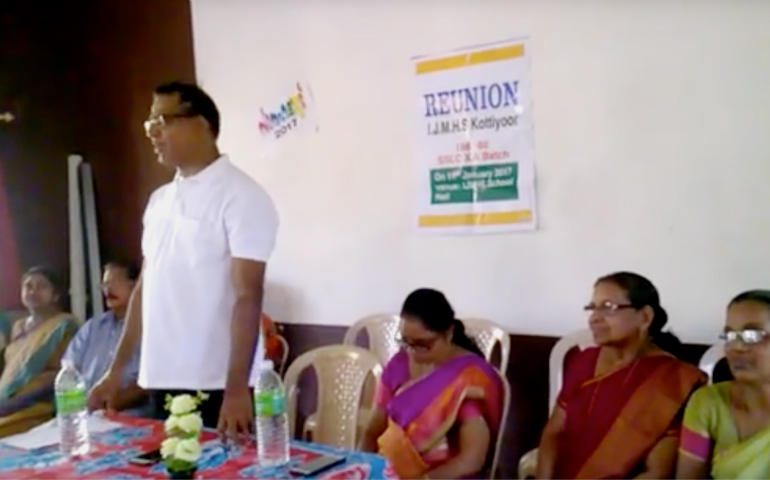
A screen capture from a YouTube video shows Fr. Robin Vadakkumcherry, standing, at an event in Kottiyoor, India, in January. (YouTube/Anil Nair)
A rash of recent alleged sex abuse cases involving Catholic priests in Southern India have left Christians distraught and frustrated over the local church's lack of response. More than 100 theologians, women religious, priests and feminists have written to India's bishops to demand they react quickly in accordance with the pope's call to end such transgressions.
"We are trying every way to get the bishops to act. We thought this is a good opportunity," says Virginia Saldanha, a theologian who was part of the team that drafted the March 22 letter to the bishops.
Astrid Lobo Gajiwala, another theologian who coordinated the letter's drafting, says the Feb. 28 arrest of a Catholic priest who allegedly raped and impregnated a young teenage girl in his parish in Kerala state spurred them to go to church authorities.
Police apprehended Fr. Robin Vadakkumcherry, 48, of the Mananthavady Diocese while he was trying to flee the country after the alleged crimes. Vadakkumcherry is now in jail awaiting trial, police said.
Fr. Thomas Therakam, another priest from the diocese, and five nuns were charged for allegedly helping Vadakkumcherry cover up the scandal. The six religious, along with a few alleged lay accomplices, went into hiding to evade arrest but later surrendered to authorities and are now out on bail.
The case outraged members of several Catholic religious and justice groups. They wrote to Cardinal Baselios Cleemis, president of the Catholic Bishops' Conference of India, saying they were "deeply concerned about the integrity and mission of the Indian Church."
Cleemis told NCR on April 22 that he had received the letter but was on a tour in the United States in April and had fallen ill on his return. He declined to comment on the contents of the letter but said he plans to present it to the Standing Committee of the conference when it meets May 2-5 in Bengaluru, Southern India. The cardinal said the bishops' conference has no direct control over the bishops and deals only with general matters the Catholic jurisdictions in India have in common.
Gajiwala told NCR that she does not expect an individual response from church leaders. She said she hopes they at least will issue a statement to express concern over the issue and list the steps they will take to prevent such cases.
She added that Cardinal Oswald Gracias, who heads the Latin rite wing of the Indian church, has promised her that he, too, would raise the matter at the May meeting.
The letter outlines six areas of concern for the church, prompted by the Vadakkumcherry case:
- Eroded fiduciary trust between priests and parishioners who consider the priest as "another Christ";
- Failure to comply with Indian criminal laws on abuse of minors and shielding the abusers;
- Need for a diocesan structure to follow up on clergy sexual abuse cases and to include women on the oversight committees that would conduct inquiries;
- The release of a bishops' conference policy to prohibit, prevent and redress sexual abuse in the church;
- Greater care in selecting candidates for the priesthood, improved seminary training and ongoing clerical formation on questions of sexuality and celibacy;
- Examination of the relationship between clergy and women religious, and the possibility that sisters might cover up cases of abuse by priests.
The 127* individuals signing the letter include members of the Indian Women Theologians Forum, Satyashodhak (discernment), Streevani (women's voice), the Forum of Religious for Justice and Peace, and the Conference of Religious India. More than half of the signers are Catholic nuns. Copies of the letter were sent to the apostolic nuncio, Archbishop Giambattista Diquattro; the heads of three ritual churches in India; and several bishops' conference officials.
The letter expressed disappointment that "it took an outside agency to blow the whistle on the crimes that had occurred." A child helpline agency notified police after receiving a tip about the case after the 16-year-old girl delivered her child in a church hospital on Feb. 7. Her baby boy was taken without her permission to an orphanage managed by nuns in Kannur district, police said.
Vadakkumcherry was the parish priest of St. Sebastian Church in Kottiyoor and manager of a school where the girl was an 11th grader. The priest had allegedly offered the girl's family 1 million rupees ($15,600) to coerce her father to claim he impregnated her.
The church hesitates to expose its criminal priests because it fears its enemies would exploit the situation, the letter says, charging that the church's clandestine management of sexual abuse cases causes more harm because "delayed corrective action festers the wound."
A demand for bishops' conference guidelines to tackle abuse cases was raised a year ago by 75 members of the Forum of Religious for Justice and Peace, a progressive group. Their request to all bishops and major superiors to check priests abusing Catholic religious women has gone unanswered.
Saldanha says she has been involved in the issue since the first clergy abuse complaint came to her in 2010. "Since then, we formed a group to try and get the church to deal with this issue in-house, but in a just manner, especially doing justice to victims."
The group drew up guidelines for how priests should deal with women, drafted a policy based on government laws, and in 2013 presented the documents to the bishops' conference through the bishops' Commission for Women.
"We were promised action," Saldanha said. "But we are still waiting for these documents to be made public."
Conference officials said they had passed guidelines to address clergy abuse cases at their biannual meeting last September and would release them publicly after fine-tuning them. The guidelines have not yet been made public.
The bishops' silence has irked some Catholics. "We don't need any wishy-washy guidelines from bishops for such heinous acts. As citizens, it is our incumbent duty to report a crime and not aid or abet it," said Chhotebhai, a former president of the All India Catholic Union who goes by a name meaning "little brother."
He says the church tends to hide in fear from abuse cases in hopes the controversy will somehow be resolved. "The church must be humble enough to admit error or wrongdoing in its ranks," the lay leader said. "Otherwise today's injury will become tomorrow's septic wound that would necessitate amputation."
Gajiwala wants the final policy from the bishops to focus on justice for the victim, rather than safeguarding the reputation of the church or the priest.
Saldanha, who was secretary of the bishops' Commission for Women and the office of the Federation of Asian Bishops' Conferences, said bishops fear a "tsunami of complaints" if the guidelines are made public.
The Indian church has faced a plethora of clergy abuse cases in the past year.
On March 21, police arrested Fr. Thomas Parackal, rector of a seminary in Kerala's Punalur Diocese, on charges of sodomizing three seminarians who were minor boys. On Dec. 9, 2016, a court in Ernakulam, Kerala, gave a priest a double life term for raping a minor girl.
To add to the church's shame, Outlook, a New Delhi-based weekly English newsmagazine, carried a cover story titled "Priestly Predators." The Jan. 30 article cites several clergy abuse cases over the years and remarks that Francis "atoned for the sins of his clergy. But the Indian Church showed no signs of remorse for pastors' sexual crimes."
The sexual abuse cases have severely shaken ordinary Catholics, especially in Kerala. E.M. Baby, a parishioner of Kottiyoor, says that their priest's "double life" has shocked them. He says Vadakkumcherry wore the mask of a strict moral disciplinarian in the parish. The priest's arrest took place as the Oriental Christians, both Catholic and Orthodox, began their Lenten period of prayer and fast.
"Very few people, especially women, went for the annual confession during Holy Week this year. People have lost faith in going to a priest," he added.
N.K. Thomas, a college professor and a Catholic in the Palai Diocese, says priests and their waywardness have become the topic of discussion in his parish. "The problem the church faces today is not want of a priest but unwanted priests," he said.
Young people join seminaries seeking the comfortable life of their priests, he added. "Our priests have lost the service mentality as they get entangled in the worldly way of life."
Fr. Babu Kalathil of the Ernakulam-Angamaly Archdiocese, which is the seat of Cardinal George Alencherry, head of the Syro-Malabar Church, says the people of Kerala, where Christianity was introduced 2,000 years ago, used to hold priests and nuns in high esteem. "That image has taken a severe beating," Kalathil told NCR.
Jesuit theologian Fr. T.K. John, who signed the letter to the bishops, says the scandals have already sullied the Indian church's face, dimmed its moral and spiritual credibility and reduced its witnessing power and opportunity. The cases have brought upon all a corporate feeling of guilt, says the priest, who has taught seminarians for more than four decades.
John and Chhotebhai want the church to pay more attention to priestly formation. The Jesuit priest wants candidates for the priesthood to learn in a free atmosphere the demands of celibate life and get guidance from competent persons to make free decisions.
"Confront as unhealthy the uncalled for secrecy and touch-it-not attitude," John told NCR. "Maturity calls for acknowledging every form of urge as normal, like hunger, thirst, etc., and deal with them openly."
Chhotebhai warns that the church should not recruit immature teenagers to become priests. He also finds fault with the laity's subservient behavior. "Like a thoroughly domesticated dog, they are so loyal to their masters that they can see no wrong in them; and if there is, they choose to turn a blind eye," he says.
Kochurani Abraham, a leading woman theologian in Kerala, says the Vadakkumcherry case has created "palpable fear" among people because they can no longer trust the church as a safe and holy place. She is disappointed that some church spokespersons have tried to dismiss the controversies as media hype meant to tarnish the church.
Abraham hopes the church will learn from the scandals, urging it to shed its "pretensions to be a 'heavenly' institution and become one with the suffering humanity, as Jesus did through his life, passion and death."
* This story has been updated to reflect five additional signers who were not originally numbered.
[Jose Kavi is the editor-in-chief of Matters India, a news portal focusing on religious and social issues in India. This article is part of a collaboration between Global Sisters Report and Matters India.]


